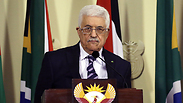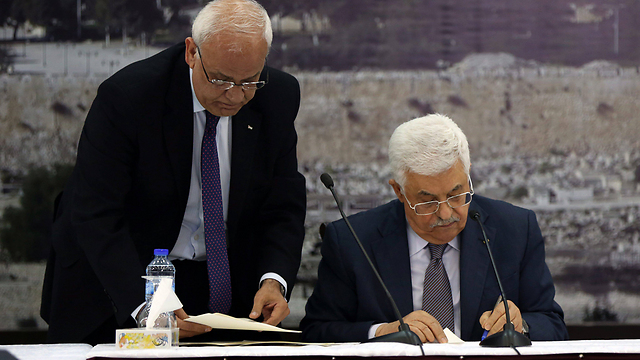
PLO officials calls for ending security coordination with Israel
Retaliatory step proposed by PLO's Central Council urges stopping security coordination, which is meant to prevent violence, including possible attacks against Israel.
The Palestinian Liberation Organization's central council announced Thursday that it recommended that Palestinian President Mahmoud Abbas stop security coordination with Israel, a step that could further escalate tensions, after it did not honor the agreements signed between the parties.
It is not clear if Palestinian President Mahmoud Abbas will implement the resolution by the PLO's Central Council.
Since the beginning of the year, both sides have taken retaliatory steps.
In January, Abbas sought membership in the International Criminal Court, paving the way for possible war crimes charges against Israel.
In response, Israel withheld tax transfers to the Palestinian Authority. Activists in Abbas' Fatah movement countered by enforcing a boycott of goods made by Israeli food companies.
Despite the tensions, security coordination between Abbas' forces and Israeli troops has continued in the West Bank. The coordination is meant to prevent violence, including possible attacks against Israel.
Meanwhile, Israel said Thursday it would ease restrictions on Gaza vegetable exports for the first time since the Islamic militant group Hamas seized power in 2007.
Cogat, the military agency that deals with Gaza civilian affairs, said farmers can begin marketing tomatoes and eggplants to Israel next week and other vegetables after that, totaling about 1,500 tons per month. Each ton is valued at about $770.
The income will help Gaza's cash-strapped farmers and other residents of the territory, where Hamas ousted forces loyal to the Western-backed Abbas nearly eight years ago.
Israel and Egypt imposed a blockade after the takeover, which Israel says is necessary to contain Hamas. Critics say the blockade amounts to collective punishment. Israel and Hamas have fought three wars since 2008 – including a 50-day war last summer – which have further devastated the local economy.
Last month Israel announced it was increasing the number of permits for Gaza merchants to travel to the West Bank and Israel for business and allowing more textile and furniture exports.
Maj. Gen. Yoav Mordechai, the commander of Cogat, said the policy is meant to "support the reconstruction and economy" of Gaza.
The easing of restrictions on vegetable exports coincides with the seventh-year sabbatical, called "shmita" in Hebrew, which began last autumn and extends through this fall. During that time, according to the Bible, Israeli farmers must give their lands a rest.
Though only a minority of the Israeli population abides by strict Jewish religious law, nearly all Israeli Jewish farmers follow the biblical directive, in part so they don't lose devout customers.
There are loopholes in place to enable Israelis to eat local produce without breaking Jewish law, but those are rejected by a minority of the very devout, who could find an alternative with the Gaza exports.
Cogat said Israel's agricultural consumption is about 1.2 million tons per year, of which the ultra-Orthodox community represents some 10 percent.











